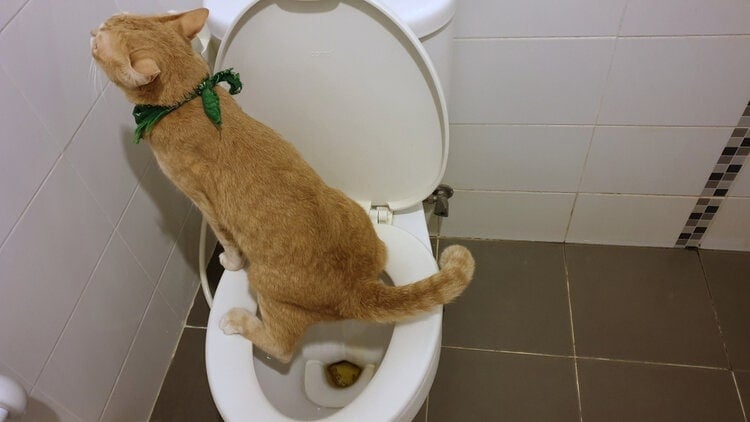Don't Flush Cat Poop Down Your Toilet - Preserve Your Home's Plumbing System
Don't Flush Cat Poop Down Your Toilet - Preserve Your Home's Plumbing System
Blog Article
The content in the next paragraphs about How to Dispose of Cat Poop and Litter Without Plastic Bags is particularly interesting. Don't miss it.

Intro
As cat owners, it's necessary to bear in mind just how we deal with our feline pals' waste. While it may seem convenient to flush cat poop down the toilet, this technique can have destructive effects for both the setting and human health and wellness.
Alternatives to Flushing
Thankfully, there are safer and extra liable ways to dispose of pet cat poop. Take into consideration the complying with alternatives:
1. Scoop and Dispose in Trash
One of the most typical approach of throwing away feline poop is to scoop it right into a naturally degradable bag and toss it in the garbage. Be sure to utilize a dedicated litter scoop and take care of the waste immediately.
2. Usage Biodegradable Litter
Go with biodegradable cat clutter made from products such as corn or wheat. These clutters are eco-friendly and can be securely taken care of in the garbage.
3. Hide in the Yard
If you have a backyard, think about burying cat waste in a designated location far from veggie yards and water resources. Make certain to dig deep sufficient to stop contamination of groundwater.
4. Install a Pet Waste Disposal System
Purchase an animal garbage disposal system specifically developed for cat waste. These systems make use of enzymes to break down the waste, lowering smell and environmental effect.
Wellness Risks
Along with environmental concerns, flushing pet cat waste can also present wellness threats to people. Feline feces may consist of Toxoplasma gondii, a bloodsucker that can cause toxoplasmosis-- a possibly extreme disease, especially for expectant women and individuals with weakened immune systems.
Environmental Impact
Flushing feline poop introduces unsafe pathogens and bloodsuckers right into the water supply, posing a significant risk to marine ecosystems. These impurities can adversely affect marine life and compromise water quality.
Conclusion
Responsible pet possession expands beyond offering food and sanctuary-- it additionally involves proper waste administration. By avoiding flushing feline poop down the toilet and choosing alternative disposal techniques, we can minimize our environmental footprint and secure human health and wellness.
Why Can’t I Flush Cat Poop?
It Spreads a Parasite
Cats are frequently infected with a parasite called toxoplasma gondii. The parasite causes an infection called toxoplasmosis. It is usually harmless to cats. The parasite only uses cat poop as a host for its eggs. Otherwise, the cat’s immune system usually keeps the infection at low enough levels to maintain its own health. But it does not stop the develop of eggs. These eggs are tiny and surprisingly tough. They may survive for a year before they begin to grow. But that’s the problem.
Our wastewater system is not designed to deal with toxoplasmosis eggs. Instead, most eggs will flush from your toilet into sewers and wastewater management plants. After the sewage is treated for many other harmful things in it, it is typically released into local rivers, lakes, or oceans. Here, the toxoplasmosis eggs can find new hosts, including starfish, crabs, otters, and many other wildlife. For many, this is a significant risk to their health. Toxoplasmosis can also end up infecting water sources that are important for agriculture, which means our deer, pigs, and sheep can get infected too.
Is There Risk to Humans?
There can be a risk to human life from flushing cat poop down the toilet. If you do so, the parasites from your cat’s poop can end up in shellfish, game animals, or livestock. If this meat is then served raw or undercooked, the people who eat it can get sick.
In fact, according to the CDC, 40 million people in the United States are infected with toxoplasma gondii. They get it from exposure to infected seafood, or from some kind of cat poop contamination, like drinking from a stream that is contaminated or touching anything that has come into contact with cat poop. That includes just cleaning a cat litter box.
Most people who get infected with these parasites will not develop any symptoms. However, for pregnant women or for those with compromised immune systems, the parasite can cause severe health problems.
How to Handle Cat Poop
The best way to handle cat poop is actually to clean the box more often. The eggs that the parasite sheds will not become active until one to five days after the cat poops. That means that if you clean daily, you’re much less likely to come into direct contact with infectious eggs.
That said, always dispose of cat poop in the garbage and not down the toilet. Wash your hands before and after you clean the litter box, and bring the bag of poop right outside to your garbage bins.
https://trenchlesssolutionsusa.com/why-cant-i-flush-cat-poop/

We hope you liked our section on Don’t flush cat feces down the toilet. Thank you so much for taking the time to read through our blog. Liked our blog? Please share it. Let someone else locate it. I treasure reading our article about How to Dispose of Cat Poop and Litter Without Plastic Bags.
Free Estimate Report this page